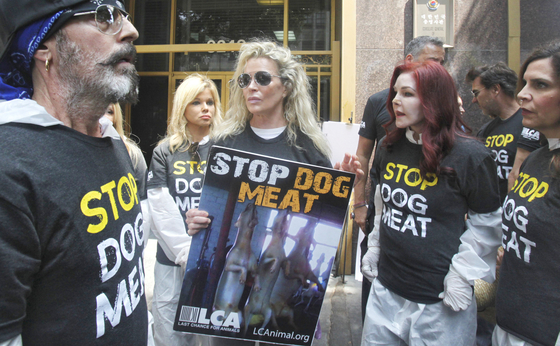
In the summer of 2019, I visited South Korea to help bring awareness to the cruel and inhumane treatment the country’s dog meat industry inflicts on dogs.
Korea was and still is the only country in the world that purposely raises dogs for meat consumption. Yes, Indonesia, China, and Vietnam also have dog meat trades, but none have large-scale dog breeding farms. South Korea is a very beautiful and progressive country, and based on my last visit and the many conversations I have had, I believe as a people, Koreans no longer want to be recognized as the only country in the world that raises dogs for humans consumption.
In 2019, I joined a rally hosted by Animal Liberation Wave (ALW) and Last Chance for Animals (LCA), two international animal rights organizations, in front of the National Assembly. The Korean Dog Farmers’ Association hosted a counter-rally next to us, eating dog meat in public. I understand and I am truly sensitive to the fact that this is a cultural issue. Koreans have eaten dog meat for a long time, and due to the importance of cows in farming, traditionally the Korean people considered cows, rather than dogs, to be man’s best friend.
In fact, the beef and dairy industries were only introduced to Korean culture in the 20th century. Before that, beef was a rarity, and milk was for calves, leaving dogs as the primary source of animal protein for many Koreans.
Later this summer, ALW and LCA will once again be active in Seoul around Boknal? the three hottest days of the summer when some Koreans eat dog meat to “beat the summer heat.” Their point will not be to judge the Korean culture; it is quite the opposite. Instead, ALW and LCA efforts this year will highlight the rising animal rights movement in Korea that is leading to monumental change. I, along with LCA, have so much reverence for South Korea and its people.
Korea has always been a leader in fashion, beauty, film, television, music, and cuisine. Since the last time I was there, BTS consolidated its place as the biggest band on the planet, Squid Game the most watched series on Netflix, and Park Chan-wook the Best Director at Cannes. Korea used to be one of the poorest countries in the world, scarred by the war. But within my own lifetime, it has evolved into one of the richest countries on the planet, with the tenth largest economy across the globe. Last year, the UN Conference on Trade and Development officially upgraded South Korea from a “developing country” to a “developed country.”
Gandhi famously said that “the greatness of a nation and its moral progress can be judged by the way its animals are treated.” By many different measurements, Korea is great, progressive, and now leading the world. A light has been shining on South Korea for a long time. The timing could not be better for Korea to take this step and become an example for every other country on the planet ? that letting go of past traditions in the name of humanity and compassion gives a nation strength, not weakness.
Korea has a unique chance to make a statement to the world by proving that an age-long tradition of eating dogs can be abandoned as a nation progresses. Despite the ongoing atrocities that continue to occur like those at the Seongnam Dog Market, I have reason to believe that Korea will achieve this feat soon.
Three years ago, I met with then-Governor Lee Jae-myung to thank him for his decision to crack down on dog slaughterhouses in Gyeonggi Province. In the last presidential election, he promised to end the dog meat trade once and for all. I was hopeful, given his track record.
But it turns out, Lee’s opponent and now-President Yoon Suk-yeol is no less an animal lover. He lives with four dogs and three cats. What’s more, First Lady Kim Keon-hee made it absolutely clear: “The problem of dog meat trade can be solved through policies such as supporting the transition of the industry people‘s livelihoods…A universal culture should be shared among developed countries because it can create negative sentiment against South Korea.”
Liberals and conservatives in Korea, alike, seem to agree, and each day there is growing public support to ban the dog meat trade. It is time for Korea to finally make the great transition.
These dogs do not need our tears. They need bold leaders to take strong action. It will not be easy, but it certainly can be done, given the right political will.
That is why I hope to visit Korea once again soon and support President Yoon and First Lady Kim’s stance on the dog meat trade. I want to meet with them to thank them and tell them they are not alone.
I have dedicated much of my life to speaking out against animal cruelty. In fact, I have said, and will continue to say, it is my passion, my purpose, and it is the most important thing I will do in my lifetime.
The world is watching. Perhaps the country that now produces many of the best music, movies, and tv shows, will also prove to be the best in its treatment of animals.
Kim Basinger is an award-winning actress and passionate animal rights activist. She hopes that all of humanity will one day treat animals with the respect they deserve.




